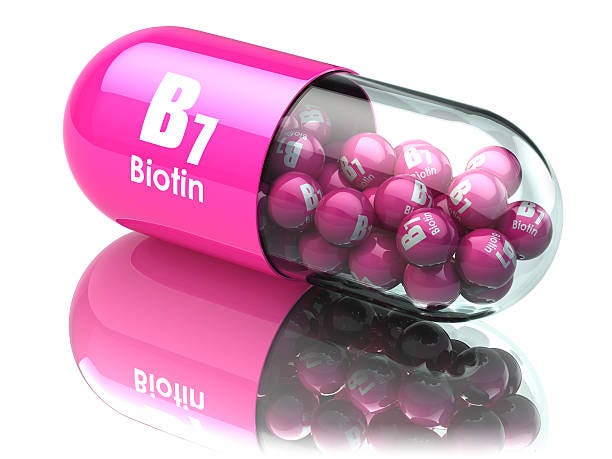Read this before you take biotin
New research provides a good reason to reconsider taking this hair-and-nail supplement.
Raise your hand if you’ve ever taken biotin in an effort to get stronger, healthier hair or nails. Of course I have, probably as long as 25 years ago. This was, of course, well before the rise of more sophisticated supplements like Nutrafol and Viviscal, and biotin was (and still is) an inexpensive and easy-to-find option.
But, did you know that despite its popularity, there’s absolutely no reliable scientific data that biotin actually works? (Derms know this, but since it’s a water-soluble vitamin that has been believed to pose little risk of harm, most haven’t discouraged patients from taking it.) But, new research shows otherwise…
You probably also didn’t know that the F.D.A. has warned that biotin supplements can interfere with laboratory medical tests, and an article published in the Journal of the American Academy of Dermatology just a few days ago confirms this advice. Among the lab tests that have been found to be affected by biotin include:
Thyroid
Troponin (58.6%)
25-Hydroxy vitamin D
Beta-human chorionic gonadotropin
Hepatitis
Human immunodeficiency virus serology
For this reason, the American Academy of Dermatology is now advising that patients should stop taking biotin two days prior to any of the above tests. Better yet, stop wasting your time and money taking a supplement that doesn’t work. (If you still want to make sure you get your daily dose in the healthiest way possible, eat more egg yolks, legumes, nuts, seeds, cauliflower and bananas.)
You’re better off investing in a high-quality hair-growth supplement like the ones I mentioned above, which have clinical results that back their claims. And remember, if you’re suddenly experiencing hair thinning or loss, it’s best to make an appointment with your dermatologist to find out what’s going on—and the ideal way to address it.




